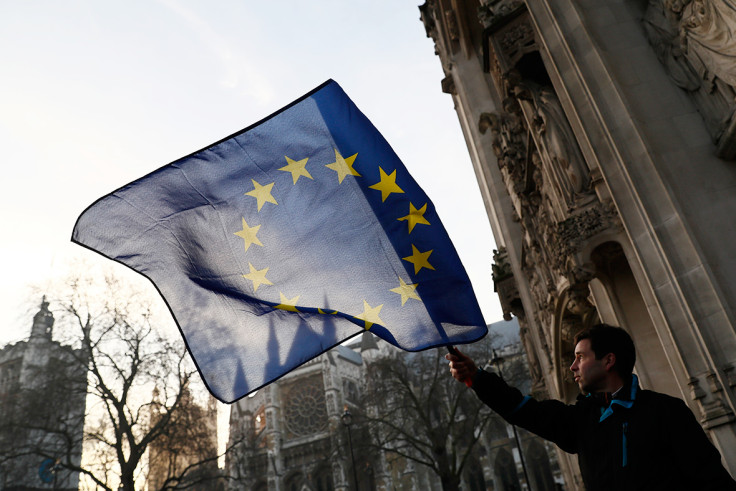Jeremy Corbyn, Paul Nuttall and MPs react to Supreme Court's Brexit judgement
Labour leader confirms he will seek to amend an Article 50 Bill in the House of Commons.
Theresa May and her ministers have been forced by the Supreme Court to accept the sovereignty of parliament, Jeremy Corbyn declared on Tuesday (24 January).
The Labour leader issued the statement almost immediately after the top judges voted eight to three to uphold the High Court's decision that MPs and peers should have vote on invoking Article 50 of the Lisbon Treaty.
The left-winger said his party respects the result of the referendum, which saw the UK vote 52% to 48% for a Brexit. But Corbyn confirmed Labour will seek to amend an Article 50 Bill to prevent the Conservatives from using Brexit to turn the UK into a "bargain basement tax haven".
"Labour will seek to build in the principles of full, tariff-free access to the single market and maintenance of workers' rights and social and environmental protections," he said.
"Labour is demanding a plan from the government to ensure it is accountable to Parliament throughout the negotiations and a meaningful vote to ensure the final deal is given Parliamentary approval."
The landmark ruling is a blow to May and her Attorney General Jeremy Wright, who unsuccessfully argued in the High Court and Supreme Court that the government had the legal authority to invoke Article 50 without consulting parliament because of "residual" prerogative powers from the crown.
But there is no precedent for such powers being used to amend and/or scrap EU-related law. The European Communities Act 1972, the legislation which enshrines the UK's membership of the EU, was passed by parliament.
An Article 50 Bill is expected to get voted through the House of Commons, while it may see some resistance in the House of Lords. Some Labour MPs, such as David Lammy, Chris Bryant and Tulip Siddiq, have vowed to defy Corbyn and oppose such draft legislation.

Liberal Democrat and SNP MPs are also planning to vote an Article 50 Bill down alongside Green co-leader Caroline Lucas. "I will not be capitulating to the Tories over Brexit – and will vote against prematurely triggering Article 50 in the Spring," she said.
"As the co-leader of a Party which stands for environmental, social and economic justice I will not support a Government offering no assurances to EU nationals living in Britain, threatening to turn this country into a tax haven and planning to throw us off the Brexit cliff edge by ending our membership of the single market and customs union."
May has promised to invoke Article 50 by the end of March and trigger two-year-long negotiations with the EU.
Supreme Court helps Parliament take back control.
— Chris Bryant MP (@RhonddaBryant) January 24, 2017
The prime minister revealed during her speech to politicians and diplomats at Lancaster House on 12 January that she will not seek to maintain the UK's membership of the EU's single market.
Ukip leader Paul Nuttall, meanwhile, warned that the Supreme Court ruling could "embolden" pro-EU campaigners.
"Other than making clear that this is a decision of the whole United Kingdom, rather than its constituent parts, what we can clearly see is that it will embolden those who rail against the decision of the people," the Erosceptic said.
"It may give heart to those in the EU, used as they are to ignoring their own people, to attempt to play hard ball in the negotiations.
"But in the end I am convinced that though this skirmish has been lost in the courts, the war will be won."

Theresa May's 12-point Brexit plan
- Government will provide certainty and clarity to politicians and businesses.
- UK will 'control our own laws' by quitting the European Court of Justice.
- Strengthen the 'precious union' between England, Wales, Northern Ireland and Scotland.
- There will be no hard border between Northern Ireland and the Republic of Ireland.
- UK will 'control' EU immigration, while recruiting the 'brightest and the best' from around the world.
- Government will seek a reciprocal residency rights deal for EU and UK workers 'as soon as possible'.
- To protect workers' rights.
- Ministers will seek a 'bold' and 'comprehensive' free trade agreement with the EU.
- UK will seek a customs agreement so that it can broker its own trade deals with non-EU nations.
- Maintain European science and innovation ties in bid to keep the UK a 'world leader'.
- UK will continue to work with the EU to combat the threat of terrorism.
- Ministers will seek to avoid a 'cliff edge' and seek a smooth split from the EU.
© Copyright IBTimes 2024. All rights reserved.









